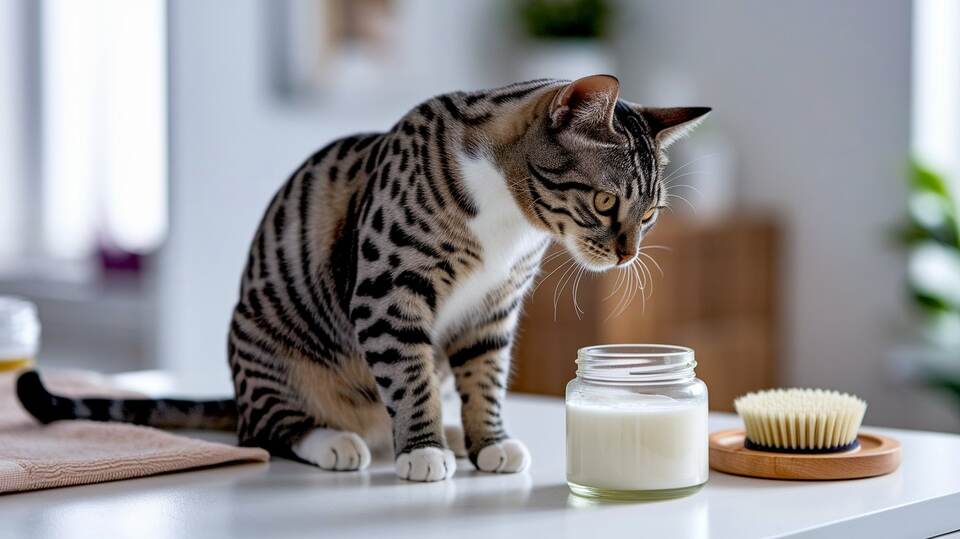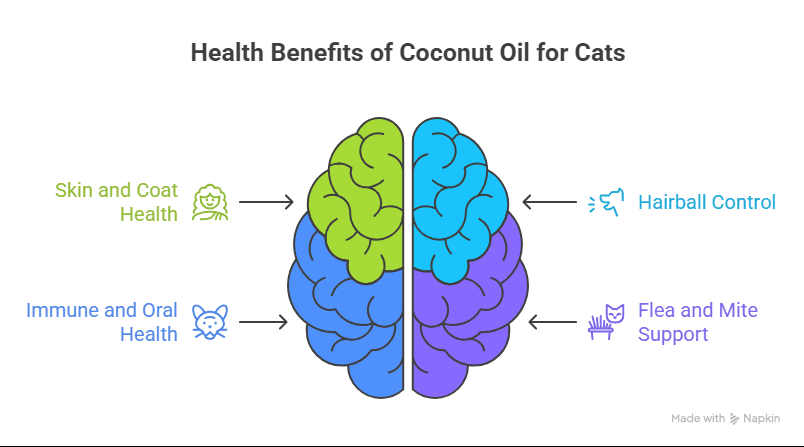
Introduction
Coconut oil has earned a glowing reputation in the health and wellness world. It’s used for everything from cooking to skincare, praised for its natural antibacterial properties and rich texture. But if you’re a cat parent, you may have found yourself wondering:
“Is coconut oil safe for cats?”
The short answer? Yes, in moderation.
Coconut oil can be a useful addition to your cat’s routine when used correctly, but it’s not a cure-all, and it comes with precautions. In this guide, we’ll dive into:
- The benefits of coconut oil for cats
- How to safely use it both topically and internally
- Which cats should avoid it
- What vets and science say
- Common questions answered
Let’s explore the facts behind this popular natural remedy and how to use it wisely with your feline companion.
What Is Coconut Oil, Exactly?
Coconut oil is extracted from the meat of mature coconuts and contains medium-chain fatty acids (MCFAs)—particularly lauric acid, which is known for its antimicrobial and anti-inflammatory properties.
There are two main types:
- Unrefined (virgin) coconut oil – cold-pressed, minimally processed, and retains the most nutrients
- Refined coconut oil – processed to remove impurities; may have fewer health benefits
For pets, especially cats, unrefined and organic virgin coconut oil is the preferred choice.
Is Coconut Oil Safe for Cats?
Yes, coconut oil is generally safe for cats when used:
- In small amounts
- With veterinary approval
- On healthy adult cats
It can be applied topically to the skin and coat or given orally in tiny amounts as a supplement. However, like any product, it’s not universally safe for every cat—and overuse or misuse can lead to health issues.
Health Benefits of Coconut Oil for Cats

While scientific research on coconut oil and cats is still limited, anecdotal evidence and some vet-backed insights suggest it may offer the following benefits:
🐾 1. Skin and Coat Health
Coconut oil’s moisturizing properties can:
- Help soothe dry, flaky skin
- Reduce dandruff
- Improve coat softness and shine
- Soothe minor irritations or insect bites
Cats with dry skin from overgrooming or allergies may benefit from occasional topical application.
🐾 2. Hairball Control
Since coconut oil can help lubricate the digestive tract, it may aid in passing hairballs more easily.
Some cat owners add small amounts to food to:
- Reduce frequency of hairballs
- Ease mild constipation
- Encourage smoother digestion
🐾 3. Immune and Oral Health
Thanks to lauric acid and other compounds, coconut oil may:
- Fight minor bacterial or fungal infections
- Improve bad breath
- Support the immune system (according to holistic veterinarians)
However, it’s not a substitute for proper dental care or vet-approved treatments.
🐾 4. Flea and Mite Support
Some pet parents use coconut oil as a natural flea deterrent due to its thick, coating texture and potential insect-repelling properties. While not a replacement for prescription flea treatments, it can:
- Act as a mild barrier
- Soothe irritated skin from bites
How to Safely Use Coconut Oil on Cats
Before using coconut oil, always consult your veterinarian, especially if your cat has medical conditions.
Here’s how to apply it safely:
✅ Topical Use
Use for:
- Dry patches
- Irritated or flaky skin
- Dull coat
- Minor rashes or insect bites
How to apply:
- Start with a pea-sized amount
- Rub gently into the affected area
- Avoid matting or greasy buildup
- Monitor your cat—some may try to lick it off
💡 Tip: Try applying when your cat is calm, like after a nap or before bedtime.
✅ Oral Use
Use for:
- Hairball control
- Occasional digestive support
- Coat improvement from the inside out
Dosage guideline:
- Start with 1/8 teaspoon per day
- Mix into wet food
- Gradually increase to 1/4 teaspoon, 2–3 times per week (max)
- Always observe for any side effects (more on that below)
Never force-feed coconut oil—cats don’t always like the taste, and overdoing it can cause stomach upset.
Potential Risks and Side Effects of Coconut Oil for Cats
Despite the benefits, coconut oil is not risk-free, especially if overused.
Here’s what to watch for:
🚨 1. Diarrhea or Loose Stool
Coconut oil can act as a natural laxative. In small doses, that might help hairballs or mild constipation—but too much can lead to:
- Runny stools
- Frequent bathroom trips
- Dehydration in severe cases
🚨 2. Vomiting or Nausea
Some cats don’t tolerate oils well in their digestive system. If your cat vomits after eating coconut oil, stop immediately.
🚨 3. Weight Gain
Coconut oil is calorie-dense and high in saturated fat. Even a teaspoon contains over 115 calories, which adds up quickly for a 10-pound cat.
🚨 4. Pancreatitis Risk
High-fat foods (including coconut oil) can trigger pancreatitis, especially in cats that are:
- Overweight
- Diabetic
- Senior or inactive
🚨 5. Allergic Reactions
Though rare, some cats may have a sensitivity or allergy to coconut oil. Signs include:
- Excessive scratching
- Redness
- Swelling or itching
Always test a small patch of skin before full topical use.
Which Cats Should Avoid Coconut Oil?
Coconut oil is not ideal for every cat. Avoid giving or applying it if your cat has:
- Obesity or a weight problem
- Pancreatitis (or a history of it)
- Diabetes or insulin resistance
- A sensitive stomach or chronic GI issues
- Allergies to plant-based oils
When in doubt, always ask your vet before adding anything new to your cat’s routine.
Best Coconut Oil for Cats: What to Look For
If you decide to try coconut oil, choose a high-quality, pet-safe product:
| Feature | Why It Matters |
| Virgin / Unrefined | Least processed, highest nutrient content |
| Cold-Pressed | Preserves natural compounds |
| Organic | Free from pesticides and additives |
| Human-Grade | Safe enough for ingestion |
| No Added Flavors | Cats are sensitive to additives |
Avoid:
- Coconut oils with added sugar, flavoring, or essential oils
- Hydrogenated coconut oil (trans fats)
Coconut Oil vs Other Natural Remedies
How does coconut oil stack up to other oils or supplements for cats?
| Remedy | Use Case | Pros | Cons |
| Coconut Oil | Skin, coat, mild digestion | Anti-microbial, affordable, versatile | Can cause diarrhea, high in fat |
| Fish Oil | Joints, heart, coat | Rich in omega-3s | Can go rancid quickly |
| Olive Oil | Constipation | Easy to find, mild taste | Limited coat benefits, less antimicrobial |
| CBD Oil | Anxiety, pain, inflammation | Holistic calming effects | Expensive, regulation varies |
Coconut oil is a great general-purpose supplement but may not replace more targeted remedies like omega-3s or CBD for specific conditions.
Vet Opinions on Coconut Oil for Cats
While research is still developing, many holistic veterinarians cautiously support coconut oil for:
- Occasional hairballs
- Dry skin
- Minor irritations
However, traditional vets may advise against its routine use—particularly due to:
- Lack of large-scale feline-specific studies
- High saturated fat content
- Risks for overweight or sensitive cats
✅ Bottom line: It can be helpful if used in moderation and under supervision.
FAQs
Can I put coconut oil in my cat’s ears?
Not recommended unless directed by a vet. While it has antimicrobial properties, ears are sensitive and prone to infection. Use vet-approved ear cleaners instead.
Is coconut oil safe for kittens?
Only under veterinary supervision. Kittens have delicate systems, and even small changes in diet or grooming products can affect them significantly.
Can coconut oil treat fleas or mites?
Not effectively. While it may soothe bite irritation or deter some bugs, it’s not a substitute for flea or mite treatments.
How often can I give my cat coconut oil?
Start with 2–3 times per week at small doses (⅛ tsp). Watch for any digestive or skin reactions.
My cat licks coconut oil off their fur, is that okay?
If applied in a small amount and they tolerate it, it’s fine. But licking in large quantities could lead to diarrhea or stomach upset.
Also Read - How Much Wet Food Should I Feed My Cat Per Day? A Complete Guide for Cat Parents
Conclusion
So, is coconut oil safe for cats?
✅ Yes, for most healthy adult cats, in small amounts, and with mindful use.
🚫 No, for cats with weight issues, pancreatitis, or sensitivity to fats.
Coconut oil can offer benefits for:
- Coat shine
- Skin dryness
- Occasional digestive support
But it’s not a miracle fix, and it should never replace veterinary care or a balanced diet.
If you want to try coconut oil with your cat:
- Start small
- Use quality oil
- Monitor for any side effects
- Always check with your vet first
Used wisely, it can be a safe, natural addition to your cat’s care routine and maybe even their favorite treat. 🐾🥥




